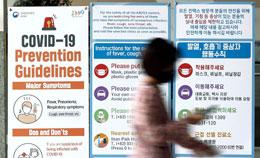COVID-19 second wave hits Asia

From curfews to closures and quarantines, Asian nations are taking renewed drastic measures to fight the second wave of coronavirus infections. Vietnam is locking down the city of Da Nang and preparing to evacuate about 80,000 people.
Elsewhere, there were new records set for daily increases this week.
In India, the epidemic is now spreading faster than anywhere else in the world, while Indonesia’s total number of infections passed 100,000, the most in Southeast Asia.
Vietnamese authorities have issued a stay-at-home order for the central city of Da Nang, and the government has been on high alert after recently recording its first local cases in three months, all in or around Da Nang, which has a population of about 1.1 million people.
Vietnam on coronavirus alert after first local infection in 100 days
South Korea on Monday recorded 25 new coronavirus cases, bringing its national caseload to 14,175 infections and 299 deaths. It has seen a recent rise in cases, most of them imported. The Korea Centres for Disease Control and Prevention on Monday said 16 of the new cases were tied to people arriving from abroad.
Meanwhile, a man who tested positive for the coronavirus in South Korea after travelling from New Zealand may have caught the disease during his transit through Singapore, the New Zealand Health Ministry said.
Infections in the Philippines rose to 82,040 on Monday with 1,945 dead, while just over 26,000 people have recovered. It has the second-highest number of infections in Southeast Asia, after Indonesia.
At least nine Chinese cities have reported Covid-19 cases linked to the northeastern city of Dalian after a new cluster emerged there within the past week.
The port city’s health authority has confirmed 44 new infections of the disease caused by the coronavirus since last Wednesday.
Other cities in Dalian’s province of Liaoning, along with cities in Heilongjiang and Jilin provinces in the northeast and Fujian in the southeast, have between them discovered at least eight asymptomatic cases traced back to Dalian, mainland Chinese media reported.
And Beijing on Tuesday confirmed its first new infection in more than three weeks, which the capital’s health commission said was found to be linked to Dalian.
India’s coronavirus epidemic is now growing at the fastest rate in the world, increasing 20 per cent over the past week to more than 1.4 million confirmed cases, including almost 50,000 on Monday – a new daily record. India trails only the US and Brazil in the number of confirmed infections.
Maharashtra, Tamil Nadu, Andhra Pradesh and Karnataka are among the states where the maximum number of daily cares are being reported.
The world’s second-most populous country has been ramping up testing, with 515,472 samples taken on Sunday, according to the Indian Council of Medical Research.
Still, India and Brazil have some of the world’s lowest testing rates, with 11.8 tests and 11.93 tests per 1,000 people respectively, compared to the US with 152.98 tests per 1,000 and Russia with 184.34, according to Our World in Data, a project-based at the University of Oxford in the UK.
Indonesia announced its confirmed number of coronavirus cases has surpassed 100,000, the most in Southeast Asia, as an official said the government still does not know when the outbreak will peak.
The Health Ministry announced 1,525 more cases on Monday, bringing the country’s confirmed total to 100,303. The actual number is thought to be considerably higher because of factors including limited testing. The ministry also reported 57 more deaths, bringing the death toll to 4,838.
Indonesia reached the milestone a week after President Joko Widodo overhauled Indonesia’s Covid-19 committee to also focus on economic recovery along with handling health aspects.
“[We] can’t let up. This aura of health crisis needs to be echoed until a vaccine is available and can be used effectively,” Widodo told a meeting on Monday addressing committee members.
An increased number of recent transmissions have been linked to work places such as offices and factories.
Japan’s health ministry will conduct its first nationwide survey, possibly next month, to look into how the pandemic has affected mental health, according to ministry and other sources.
The online survey covering 10,000 people is aimed at finding out if the government’s requests for citizens to avoid unnecessary outings and voluntarily shut businesses led to a rise in cases of depression and other forms of mental stress, the sources said.
The results of the poll are expected to be used by local mental health and welfare centres across the country in responding to future mental illness cases amid a sign of a resurgence in Covid-19 infections.
But there is also some encouraging news.
After almost seven months, the Covid-19 pandemic continues to challenge the world, but some places seem to have managed surprisingly well. Thailand has not reported any local transmission for over 60 days. The countries of the Mekong region have reported so few cases that many people are asking whether their success is real – and if it is, how are they doing it? The New York Times went as far as to report that “no one knows what Thailand is doing right”.
Thailand began screening all airport arrivals for fever on 3 January (two days before the PRC confirmed to the World Health Organisation that they had identified a “pneumonia of unknown cause”). Ten days later, Thailand confirmed its first case: the first known case outside the PRC. After confirming just 800 cases, Thailand announced a state of emergency and began a strict lockdown on 26 March. They only began easing the lockdown in May. – Agencies









